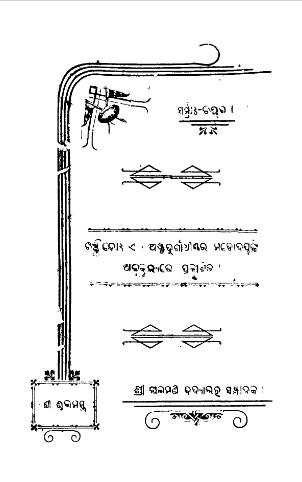In the realm of Odia literature, few works have captured the imagination of readers as profoundly as Samrata Charita, edited by the distinguished scholar Nilamani Bidyaratna and published in 1914. This seminal work stands out as a significant contribution to historical narratives in Odisha, intertwining rich storytelling with cultural heritage, and offering insights into the lives of great kings and their legacies.
Samrata Charita, translating to The Chronicles of the Emperor, focuses on the life and achievements of the legendary figure, Samrat Ashoka. Known for his transformative reign and promotion of Buddhism, Ashoka represents a pivotal moment in Indian history, and Bidyaratna’s exploration of his character serves to illuminate the values and philosophies that shaped his rule. The text delves into themes of governance, morality, and the profound impact of ethical leadership, presenting Ashoka not merely as a ruler but as a beacon of peace and social justice.
One of the remarkable aspects of Samrata Charita is its narrative style, characterized by vivid descriptions and dynamic storytelling. Bidyaratna’s editing integrates various sources and historical accounts, blending them seamlessly to create a compelling narrative that brings the past to life. The text is organized in a way that allows readers to immerse themselves in the historical context, offering glimpses into the socio-political landscape of Ashoka’s time. Through his engaging prose, Bidyaratna captures the complexities of leadership and the moral dilemmas faced by rulers—challenges that remain relevant in contemporary discussions about governance.
Furthermore, Samrata Charita serves as a cultural artifact, reflecting the linguistic beauty of Odia. Bidyaratna’s command of the language enhances the text, making it not only an educational resource but also a literary treasure. His use of idiomatic expressions, poetic elements, and eloquent phrasing contributes to the richness of the narrative, ensuring that it resonates with readers on multiple levels. The book stands as an example of the literary potential of Odia, showcasing its ability to convey profound ideas and historical narratives effectively.
The publication of Samrata Charita in 1914 is also significant within the historical context of India, as it coincided with a period of awakening among various linguistic and cultural groups. As sentiments of nationalism began to emerge, works like Bidyaratna’s text played a crucial role in fostering a sense of pride in local history and identity. By highlighting the accomplishments of regional figures and their contributions to the larger tapestry of Indian civilization, Samrata Charita encourages a reevaluation of cultural narratives that transcend colonial perspectives.
Moreover, the book offers valuable lessons in ethical governance and the importance of compassion and social responsibility. Ashoka’s commitment to moral principles and his promotion of non-violence serve as compelling reminders of the enduring relevance of these values in today’s complex world. By studying the historical account of Ashoka through Bidyaratna’s lens, readers are prompted to consider the implications of leadership, both in historical contexts and in current societal structures.
Books Info
| Books name | Samrata Charita / ସମ୍ରାଟ ଚରିତ |
| Author | Nilamani Bidyaratna, Ed. |
| No Of pages | 18 |
| Publisher | NA |
| Publication | 1902 |
| Printed At | NA |
| Distributor | NA |

